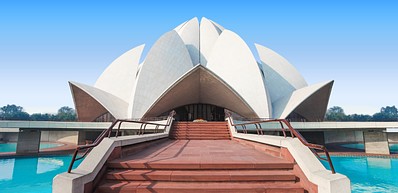
-
![Jama Masjid is the principal mosque of Old Delhi in India.]() Provided by: saiko3p/Shutterstock.com
Provided by: saiko3p/Shutterstock.com

Our travel guides are free to read and explore online. If you want to get your own copy, the full travel guide for this destination is available to you offline* to bring along anywhere or print for your trip.
*this will be downloaded as a PDF.Price
€4,95
Jama Masjid
The guide was updated:The Jama Masjid was built by the Islamic ruler Shah Jahan to complement his new Red Fort. Completed in 1658 as the largest mosque in India, it boasts a stunning courtyard that provides space for 25,000 worshipers as well as a vast dome and two minarets.
Useful Information
- Address: Chawri Bazaar, New Delhi
- More Info: Tourist are not allowed during prayer hours
- Opening hours: Daily 7am–noon / 1:30pm–6:30pm
- Tickets: Free entry; Photography ₹ 300
- Public Transport: Metro station: Chawri Bazaar
- Phone: +91 11 23 36 5358

From EUR 15
Lowest price guaranteedDigital Travel Guide Download
Our travel guides are free to read and explore online. If you want to get your own copy, the full travel guide for this destination is available to you offline* to bring along anywhere or print for your trip.
*this will be downloaded as a PDF.Price
€4,95

The most outstanding Sihk house of worship in town, Gurdwara Bangla Sahib boasts stunning architectural features and a characteristic golden dome. Located near the Connaught Place in the centre of New Delhi, it welcomes people of every status and faith.
Read more

National Gandhi Museum
The National Gandhi Museum has numerous exhibits depicting the life of Indian political activist Mahatma Gandhi. Going back to 1948 when his assassination took place, the exhibition intends to give a fresh insight into the life of the leader of the Indian independence movement and his non-violent opposition and philosophy.
Read more
Connaught Place
Connaught Place, a prominent commercial and financial hub in central New Delhi, is renowned for its unique colonial-style architecture and hosts several attractions and cultural landmarks. Notable sites include Palika Bazaar, an underground market; Jantar Mantar, an 18th-century astronomical observatory; Hanuman Temple, a historic temple dedicated to Lord Hanuman; and Gurudwara Bangla Sahib, a prominent Sikh temple known for its beautiful architecture and serene atmosphere.
As a major shopping destination, Connaught Place offers a blend of high-end boutiques, international brands, street markets, and traditional Indian shops. Visitors can explore Janpath Market for a wide range of goods and the State Emporiums for handicrafts, textiles, and artefacts from different Indian states. The area also features art galleries, theatres, and a diverse range of dining options, from high-end restaurants to street food vendors, providing various cuisines and dining experiences.
Read more

Akshardham Temple
A major draw for tourists, Swaminarayan Akshardham temple has a peculiar charm and an architectural structure that enchants Indians and travellers alike. The beautiful gardens exhale more than 10,000 years of Indian culture in a magical show of India's greatness.
Read more

Taj Mahal
Another incredible UNESCO treasure, this majestic construction is an early example of the exquisite Islamic style that reached its culmination in the most famous tomb on Earth, the Taj Mahal. Dating back to 1632, the ivory-white mausoleum was built to house the tomb of the Mughal emperor's favourite wife and it is located in Agra, a city on the banks of the river Yamuna.
Read more

Lodhi Gardens
An idyllic escapade in the city centre, the park is a green oasis gifted with some stunning constructions dating back to the 15th century, wonderful tombs mosques and elegant bridges. The great contrast with the bustling city is a welcome change, offering a perfect solution for a relaxing stroll.
Read more

Sunder Nursery
The recently inaugurated green oasis (the Indian capital's version of Central Park) features Delhi's first arboretum, with multiple species of trees (including a Bonsai House), plants, birds and butterflies. Mughal architecture dating back to the 16th century still remains on park grounds, along with the adjacent Humayun's Tomb. The city zoo is not too far from here; future plans include linking the two to one another to create one vast recreational expanse.
Read more

Jama Masjid
The Jama Masjid was built by the Islamic ruler Shah Jahan to complement his new Red Fort. Completed in 1658 as the largest mosque in India, it boasts a stunning courtyard that provides space for 25,000 worshipers as well as a vast dome and two minarets.
Bookable
Read more

Bahai Lotus Temple
Finished in 1986, the Lotus Temple welcomes everyone, regardless of religious beliefs or background. Although no sermons are delivered nor ritualistic ceremonies practiced, the serenity of the environment offers a great meditation spot and a shady garden to escape to.
Read more

The Red Fort (lal Quila)
A pinnacle of Delhi’s Mughal architecture, the Red Fort stands near the Yamuna River in Old Delhi with its sandstone walls glowing red in the sun. A perfect example of pre-British Islamic Indian architecture, the Fort still exudes the power and majesty of those times, representing a world heritage of immeasurable beauty.
Read more

Purana Quila (Old Fort)
Purana Quila (Old Fort), a massive fortress with three gateways, is located on the ancient part of the city and it allegedly stands on the site of the legendary city of Indraprastha, mentioned in the Mahabharata Hindu text. The fort was completed by the ruler Sher Shah in the mid-16th century.
Read more

Chandni Chowk
Running from the Fatehpuri Masjid (mosque) in the West to the Red Fort in the East, Chandni Chowk is the main artery of Old Delhi. It is the most crowded, colourful, and cacophonous bazaar in the whole of Delhi, a wonder to delve into by rickshaw and where anything, from knickknacks to delicious street food, can be found.
Read more

Qutub Minar
A tapering tower located south of New Delhi, Qutub Minar rises on a UNESCO World Heritage Site and one of the finest examples of the Afghan architecture that sprang up in the Islamic India from 1193. Thought to be a victory tower, it is said to be constructed to celebrate the beginning of the Muslim domination in India and, with the Qutub Complex, it is a show of that long gone majestic era.
Read more

The National Museum
Situated in the heart of New Delhi, the National Museum holds exhibits from throughout the whole of Indian history, including relics of the Indus Valley civilisation, sculptures from the Mauryan civilisation, South Indian Vijayanagar artefacts and a Buddhist gallery, representing a cultural centre and a treasure of immeasurable value.
Read more

National Gallery of Modern Art
The National Gallery of Modern Art houses some of the world's largest exhibitions, boasting thousands of Modern Art works made by Indian iconic artists. Located on the Rajpath near the India Gate, it offers some beautiful gardens where to relax after an intensive journey through India's modern history.
Read more

The Garden of Five Senses
In the city's hustle lies The Garden of Five Senses, a treasure of over 20 acres where tranquillity and serenity reign. The garden was designed to awaken the five senses with its indescribable beauty and breathtaking attractions. At the Garden of Five Senses you will find a replica of the Mexican Mayan Labná Arc, unique sculptures of children praying, stone crafted elephant troop, well-lit fountains, and more. Cultural festivals, including the Dandiya festivals, the Garden Tourism Festival, food festivals, and more are held here around the year.
Read more

Sulabh International Museum of Toilets
Handling something as unusual and amusing as toilets, Sulabh International Museum integrates some bizarre exhibits with a matter of fundamental importance in India such as sanitation. Founded by Dr. Bindeshwar, an inspiring personality who strongly contributed to integrate untouchables, it aims to educate about sanitation and its development throughout the years.
Read more

